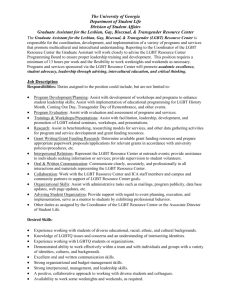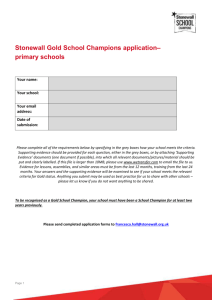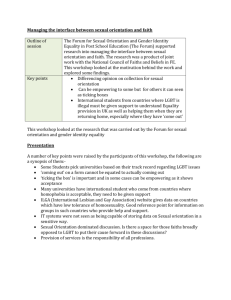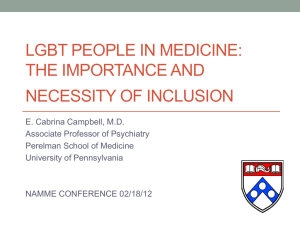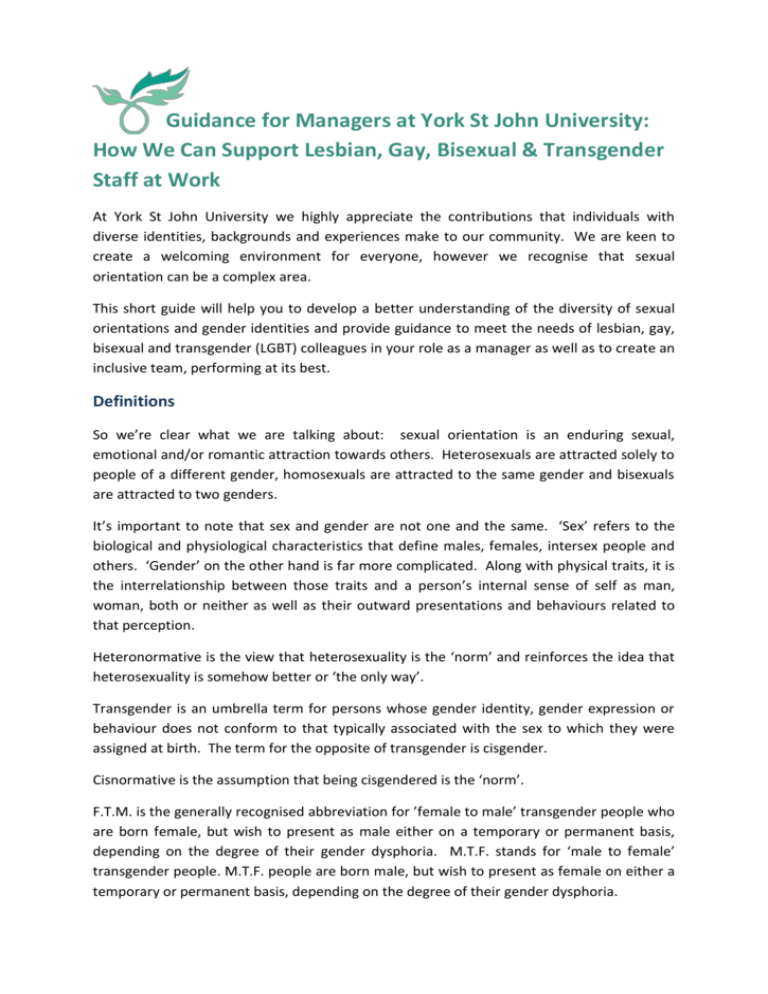
Guidance for Managers at York St John University:
How We Can Support Lesbian, Gay, Bisexual & Transgender
Staff at Work
At York St John University we highly appreciate the contributions that individuals with
diverse identities, backgrounds and experiences make to our community. We are keen to
create a welcoming environment for everyone, however we recognise that sexual
orientation can be a complex area.
This short guide will help you to develop a better understanding of the diversity of sexual
orientations and gender identities and provide guidance to meet the needs of lesbian, gay,
bisexual and transgender (LGBT) colleagues in your role as a manager as well as to create an
inclusive team, performing at its best.
Definitions
So we’re clear what we are talking about: sexual orientation is an enduring sexual,
emotional and/or romantic attraction towards others. Heterosexuals are attracted solely to
people of a different gender, homosexuals are attracted to the same gender and bisexuals
are attracted to two genders.
It’s important to note that sex and gender are not one and the same. ‘Sex’ refers to the
biological and physiological characteristics that define males, females, intersex people and
others. ‘Gender’ on the other hand is far more complicated. Along with physical traits, it is
the interrelationship between those traits and a person’s internal sense of self as man,
woman, both or neither as well as their outward presentations and behaviours related to
that perception.
Heteronormative is the view that heterosexuality is the ‘norm’ and reinforces the idea that
heterosexuality is somehow better or ‘the only way’.
Transgender is an umbrella term for persons whose gender identity, gender expression or
behaviour does not conform to that typically associated with the sex to which they were
assigned at birth. The term for the opposite of transgender is cisgender.
Cisnormative is the assumption that being cisgendered is the ‘norm’.
F.T.M. is the generally recognised abbreviation for ’female to male’ transgender people who
are born female, but wish to present as male either on a temporary or permanent basis,
depending on the degree of their gender dysphoria. M.T.F. stands for ‘male to female’
transgender people. M.T.F. people are born male, but wish to present as female on either a
temporary or permanent basis, depending on the degree of their gender dysphoria.
Being Your Authentic Self at Work
Though sexual orientation and gender identity is a person’s private matter, it can be
extremely beneficial to members of staff to simply feel accepted and included, no matter
what.
The process of telling others about your sexual orientation or gender identity is often
referred to as ‘coming out’. Coming out is not necessarily a one-off event – people may
have to come out many times during their lives.
LGBT staff should be in control about who they are out to and when.
Some staff may be comfortable for some colleagues to know but not others and therefore it
is not appropriate to assume that others know about a colleague’s sexual orientation or
gender identity or that it’s okay to share information related to it e.g. if a woman has a wife.
However, allowing LGBT colleagues to be their authentic selves at work will not only allow
for a happier team and higher work satisfaction but a better performance, too. Research by
the LGB charity Stonewall showed that staff who are out at work are overwhelmingly more
satisfied at work and see their performance improve.
In addition, it is really important that none of our staff members have to hide their true
selves and thereby experience any negative effects like loneliness, isolation, invisibility or
even fear. LGBT colleagues who are not out at work are unlikely to complain about
harassment for fear that through this complaint their sexual orientation or gender identity
might become known.
Did you know? Deliberately outing a colleague or student against their will is
considered harassment and may result in action being taken under our disciplinary
procedures.
Supporting a Member of Your Team
When a person tells someone they are LGBT, it’s an indication that they have confidence
that they will respond appropriately, and that they trust them. It might also indicate that
they require support. As a manager it is therefore a good opportunity to reinforce that they
can be themselves and that being LGBT does not present a challenge or a problem.
In order to support a colleague coming out you should:
Offer reassurance
Tell them that their confidentiality will be respected
Listen and be supportive
Ask them whether they would like further information or guidance
Let them know they can come and talk to you again or recommend someone else
that they can speak to. There are some useful resources at the end of this guidance
document.
As a manager there are development programmes available through the Staff
Development team which will help to equip you with the appropriate skills in managing a
diverse team, with diverse needs. In addition, there is some useful guidance available
through the Stonewall website at: www.stonewall.org.uk.
Being Part of an Inclusive Team at Work
Banter can be fun, bringing people together and helping to build a team. It has benefits for
stress-reduction and can raise the team’s morale. However, as managers we have to make
sure that nobody is feeling uncomfortable about or offended by this banter, which
sometimes can be hard to tell. Jokes that promote negative stereotypes or use offensive
language have to be taken seriously. If in doubt whether banter was harmless or harmful,
seek feedback and views from the LGBT Staff Network or from our Equality and Diversity
Adviser to get a better understanding of the individual’s situation. Each person will have
different feelings about banter and it is important that we intervene in a clear and timely
manner where an offence has been made. Be inclusive, build mutual trust and
understanding, and promote respect of each other.
At York St John University we say no to homophobia, biphobia, transphobia,
hostility, harassment or prejudice and don’t let any such behaviour go unrecognised or
unchallenged. The mandatory equalities training includes a section about dealing with
offensive banter and the responsibilities of everyone employed at York St John
University.
Understanding the Experience of being LGBT
Being LGBT doesn’t end with office hours so we have to be aware of the issues that LGBT
colleagues can face in the wider society, in contact with students or at social gatherings.
Think about how:
Work events and social gatherings for LGB people who might not be out where there
is an expectation of being accompanied by a partner may cause stress.
LGBT colleagues might feel burdened when they are out, for instance they may be
assumed to be a role model for other colleagues or students and expected to
function as pastoral caregivers.
LGBT colleagues might experience pressure to conform with heteronormative and
cisnormative expectations. LGBT colleagues may have to cope with bias and
hostility. Being out can make a person feel more vulnerable to prejudice and the
process of deciding whom to trust can take a lot of their energy and become a cause
of major stress.
Being transgender does not mean the person is or is not LGB. Do not make
assumptions about the sexual orientation of a M.T.F. or F.T.M. colleague.
Lesbian or transgender women may consider that being a woman is a barrier at
work, and these women may be wary about coming out so as not to face double
discrimination.
Staff do not always fall into just one protected group. Black and minority ethnic staff
that are LGBT may find themselves pressurised to identify with either their ethnicity,
sexual orientation or gender identity rather than simply being seen as themselves.
Bear in mind how those individuals may face racism from other LGBT people or
homophobia, biphobia or transphobia from people from the same cultural or ethnic
background.
Bisexuals may find themselves struggling for acceptance with either lesbian or gay
colleagues as well as their heterosexual team members.
Some LGBT people experience a conflict between their sexual orientation and their
faith. A number of religions, or specific subsets of those religions, can be hostile
towards non-heterosexual and non-cisgender identities, which can alienate LGBT
people of faith.
Whatever challenges the LGBT person you know might face, think about ways to support
them and offer your help where possible.
Did you know? Our University policies are inclusive of same-sex partners, our pension
schemes allow for pensions to be paid to same-sex partners where financial interdependence
is shown and we grant LGBT staff with dependents the same rights as other employees.
Being a Supportive Manager:
Do not assume that everyone or anyone is heterosexual and cisgender.
Create an inclusive atmosphere and encourage all staff to learn more about LGBT
issues.
Make sure that social invitations use inclusive language, for example, use the
word ’partner’.
Promote awareness of our LGBT Staff Network and our University policies.
Appreciate contributions by staff to promote LGBT equality.
Take prompt actions against homophobic, biphobic, transphobic or otherwise
offensive banter, even if you are not aware that you have any LGBT staff.
Internal Resources/Advice Available From:
Marije Davidson, Equality and Diversity Adviser
Email: m.davidson@yorksj.ac.uk Telephone: 01904 406457
The Human Resources Team
Email: humanresources@yorksj.ac.uk Telephone: 01904 876619
The Dignity and Respect Network
Contacts available at: http://www.yorksj.ac.uk/human-resources/hr/working-atysj/health--wellbeing/harassment.aspx
External Resources/Advice Available From:
Stonewall (charity working for lesbian, gay and bisexual equality)
Website: www.stonewall.org.uk Telephone: 08000 502020
Beaumont Society (self-help group for transgender people)
Website: www.beaumontsociety.org.uk Telephone: 01582 412220 (information line)
LGBT STAFF NETWORK
Contact: Andy Law, Secretary
Email: a.law@yorksj.ac.uk Telephone: 01904 876767
LGBT Staff Network blog: http://blog.yorksj.ac.uk/lgbt/


